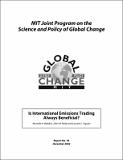| dc.contributor.author | Babiker, Mustafa H.M. | en_US |
| dc.contributor.author | Reilly, John M. | en_US |
| dc.contributor.author | Viguier, Laurent L. | en_US |
| dc.date.accessioned | 2003-10-24T14:57:35Z | |
| dc.date.available | 2003-10-24T14:57:35Z | |
| dc.date.issued | 2002-12 | en_US |
| dc.identifier.other | no. 93 | en_US |
| dc.identifier.uri | http://mit.edu/globalchange/www/abstracts.html#a93 | en_US |
| dc.identifier.uri | http://hdl.handle.net/1721.1/3628 | |
| dc.description | Abstract in HTML and technical report in PDF available on the Massachusetts Institute of Technology Joint Program on the Science and Policy of Global Change website (http://mit.edu/globalchange/www/). | en_US |
| dc.description.abstract | Economic efficiency is a major argument for the inclusion of an international emission permit trading system under the Kyoto Protocol. Using a partial equilibrium framework, energy system models have shown that implementing tradable permits for greenhouse gases internationally could reduce compliance costs associated with the emission targets. However, we show that international emission trading could be welfare decreasing under a general equilibrium framework. We describe a case of immiserizing growth in the sense of Bhagwati where the negative terms of trade and tax-interaction effects wipeout the primary income gains from emission trading. Immiserizing emission trading occurs only when there are pre-existing distortions in the economy. Simulation results based on a CGE model developed at MIT (the EPPA model) show that under an EU-wide emission trading regime the introduction of a permit trading system cause welfare losses for some of the trading countries. | en_US |
| dc.format.extent | 26 p. | en_US |
| dc.format.extent | 503009 bytes | |
| dc.format.mimetype | application/pdf | |
| dc.language.iso | en_US | en_US |
| dc.relation.ispartofseries | Report no. 93 | en_US |
| dc.title | Is international emissions trading always beneficial? | en_US |

